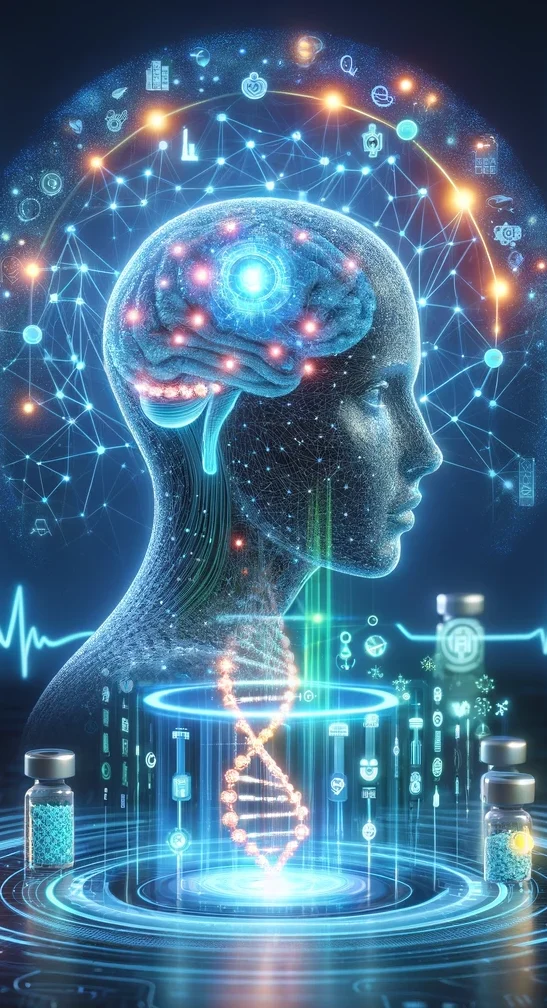
The integration of Artificial Intelligence into personalized medicine is revolutionizing how we approach treatment and care. This fusion of technology and healthcare is not just a leap forward, it’s also a paradigm shift, promising a future where treatments are not just effective but are tailored for each individual.
Understanding Personalized Medicine
Personalized medicine, often used interchangeably with precision medicine, refers to the tailoring of medical treatment to the individual characteristics of each patient. It moves away from the one-size-fits-all approach, taking into account the genetic, environmental, and lifestyle factors that can affect a patient’s response to treatment. The aim is to optimize medical care and treatment decisions, making them more effective and reducing the likelihood of adverse effects.
AI: A Game-Changer in Personalized Medicine
AI’s ability to process and analyze large datasets is at the heart of its role in personalized medicine. This capability is crucial, considering the immense and ever-growing volume of health data, including electronic health records (EHRs), genetic data, and information from wearable health devices.
AI in Analyzing Patient Data
AI algorithms, particularly machine learning (ML) models, excel in identifying patterns and correlations in large datasets. In the context of healthcare, this means AI can analyze EHRs to find hidden patterns that might elude human analysis. For instance, by examining a patient’s medical history, family history, lifestyle choices, and even social determinants of health, AI can help clinicians develop more personalized treatment plans.
AI and Genetic Information
The potential of AI extends into the realm of genomics, a cornerstone of personalized medicine. Genomic data is complex and voluminous, making it a perfect candidate for AI analysis. AI algorithms can quickly sift through genetic information to identify mutations and variations linked to certain diseases. This rapid analysis is invaluable in conditions like cancer, where genetic mutations play a crucial role in the disease’s progression and response to treatment.
Predicting Drug Responses
Another area where AI is making significant strides is in pharmacogenomics, the study of how genes affect a person’s response to drugs. AI can predict how patients might respond to certain medications, considering their genetic makeup. This capability is crucial in avoiding adverse drug reactions, which are a leading cause of hospitalizations and deaths in healthcare.
Customizing Treatment Plans
Perhaps the most direct application of AI in personalized medicine is in the development of customized treatment plans. AI can integrate and analyze data from various sources, including medical imaging, lab results, and patient-reported symptoms, to guide clinicians in choosing the most effective treatment. In oncology, for example, AI helps in identifying the specific characteristics of a tumor, leading to more targeted and effective treatment strategies.
Challenges & Considerations
While the potential of AI in personalized medicine is immense, it’s not without challenges. Data privacy and security are paramount, given the sensitive nature of health information. Ensuring the confidentiality and integrity of patient data is critical in gaining public trust.
Another challenge lies in the ethical considerations of AI applications. Issues such as biases in AI algorithms, which can lead to disparities in healthcare outcomes, need to be addressed. Ensuring that AI models are transparent and their decision-making processes are understandable is essential for clinicians and patients alike.
The Future of AI in Personalized Medicine
The future of AI in personalized medicine is not just about technological advancement, it’s about a more profound, more empathetic approach to healthcare. AI’s role is evolving from a mere analytical tool to an integral part of the decision-making process in healthcare. As AI systems continue to improve, we can expect more accurate predictions, better understanding of diseases, and more effective, personalized treatment plans.
AI’s integration into personalized medicine is a beacon of hope for a future where healthcare is not just about treating diseases but about understanding and caring for the individual. By harnessing the power of AI, healthcare can move towards more personalized, effective, and efficient care, transforming lives and shaping the future of medicine. In this journey, the fusion of technology and healthcare is not just an advancement; it’s a promise of a healthier, more personalized future for everyone.

